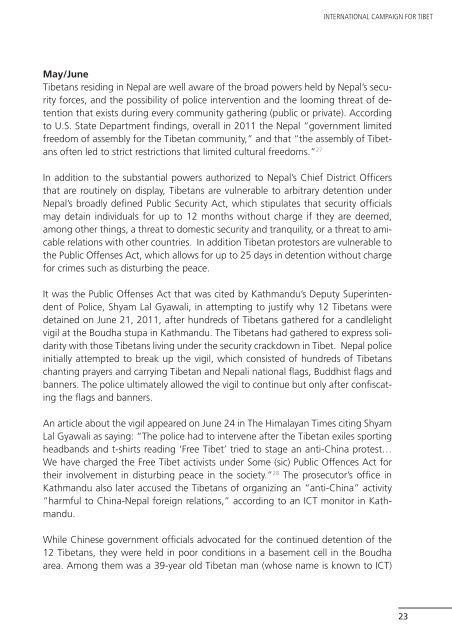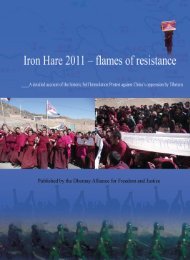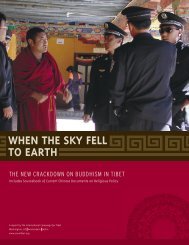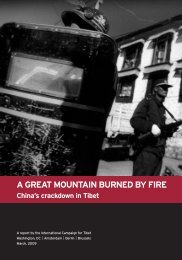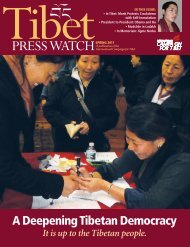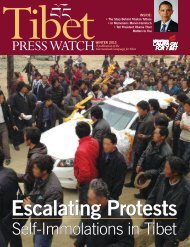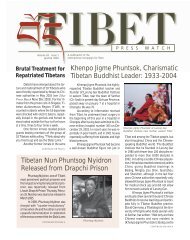DANGEROUS CROSSING: - International Campaign for Tibet
DANGEROUS CROSSING: - International Campaign for Tibet
DANGEROUS CROSSING: - International Campaign for Tibet
Create successful ePaper yourself
Turn your PDF publications into a flip-book with our unique Google optimized e-Paper software.
INTERNATIONAL CAMPAIGN FOR TIBET<br />
May/June<br />
<strong>Tibet</strong>ans residing in Nepal are well aware of the broad powers held by Nepal’s security<br />
<strong>for</strong>ces, and the possibility of police intervention and the looming threat of detention<br />
that exists during every community gathering (public or private). According<br />
to U.S. State Department findings, overall in 2011 the Nepal “government limited<br />
freedom of assembly <strong>for</strong> the <strong>Tibet</strong>an community,” and that “the assembly of <strong>Tibet</strong>ans<br />
often led to strict restrictions that limited cultural freedoms.” 27<br />
In addition to the substantial powers authorized to Nepal’s Chief District Officers<br />
that are routinely on display, <strong>Tibet</strong>ans are vulnerable to arbitrary detention under<br />
Nepal’s broadly defined Public Security Act, which stipulates that security officials<br />
may detain individuals <strong>for</strong> up to 12 months without charge if they are deemed,<br />
among other things, a threat to domestic security and tranquility, or a threat to amicable<br />
relations with other countries. In addition <strong>Tibet</strong>an protestors are vulnerable to<br />
the Public Offenses Act, which allows <strong>for</strong> up to 25 days in detention without charge<br />
<strong>for</strong> crimes such as disturbing the peace.<br />
It was the Public Offenses Act that was cited by Kathmandu’s Deputy Superintendent<br />
of Police, Shyam Lal Gyawali, in attempting to justify why 12 <strong>Tibet</strong>ans were<br />
detained on June 21, 2011, after hundreds of <strong>Tibet</strong>ans gathered <strong>for</strong> a candlelight<br />
vigil at the Boudha stupa in Kathmandu. The <strong>Tibet</strong>ans had gathered to express solidarity<br />
with those <strong>Tibet</strong>ans living under the security crackdown in <strong>Tibet</strong>. Nepal police<br />
initially attempted to break up the vigil, which consisted of hundreds of <strong>Tibet</strong>ans<br />
chanting prayers and carrying <strong>Tibet</strong>an and Nepali national flags, Buddhist flags and<br />
banners. The police ultimately allowed the vigil to continue but only after confiscating<br />
the flags and banners.<br />
An article about the vigil appeared on June 24 in The Himalayan Times citing Shyam<br />
Lal Gyawali as saying: “The police had to intervene after the <strong>Tibet</strong>an exiles sporting<br />
headbands and t-shirts reading ‘Free <strong>Tibet</strong>’ tried to stage an anti-China protest…<br />
We have charged the Free <strong>Tibet</strong> activists under Some (sic) Public Offences Act <strong>for</strong><br />
their involvement in disturbing peace in the society.” 28 The prosecutor’s office in<br />
Kathmandu also later accused the <strong>Tibet</strong>ans of organizing an “anti-China” activity<br />
“harmful to China-Nepal <strong>for</strong>eign relations,” according to an ICT monitor in Kathmandu.<br />
While Chinese government officials advocated <strong>for</strong> the continued detention of the<br />
12 <strong>Tibet</strong>ans, they were held in poor conditions in a basement cell in the Boudha<br />
area. Among them was a 39-year old <strong>Tibet</strong>an man (whose name is known to ICT)<br />
23


